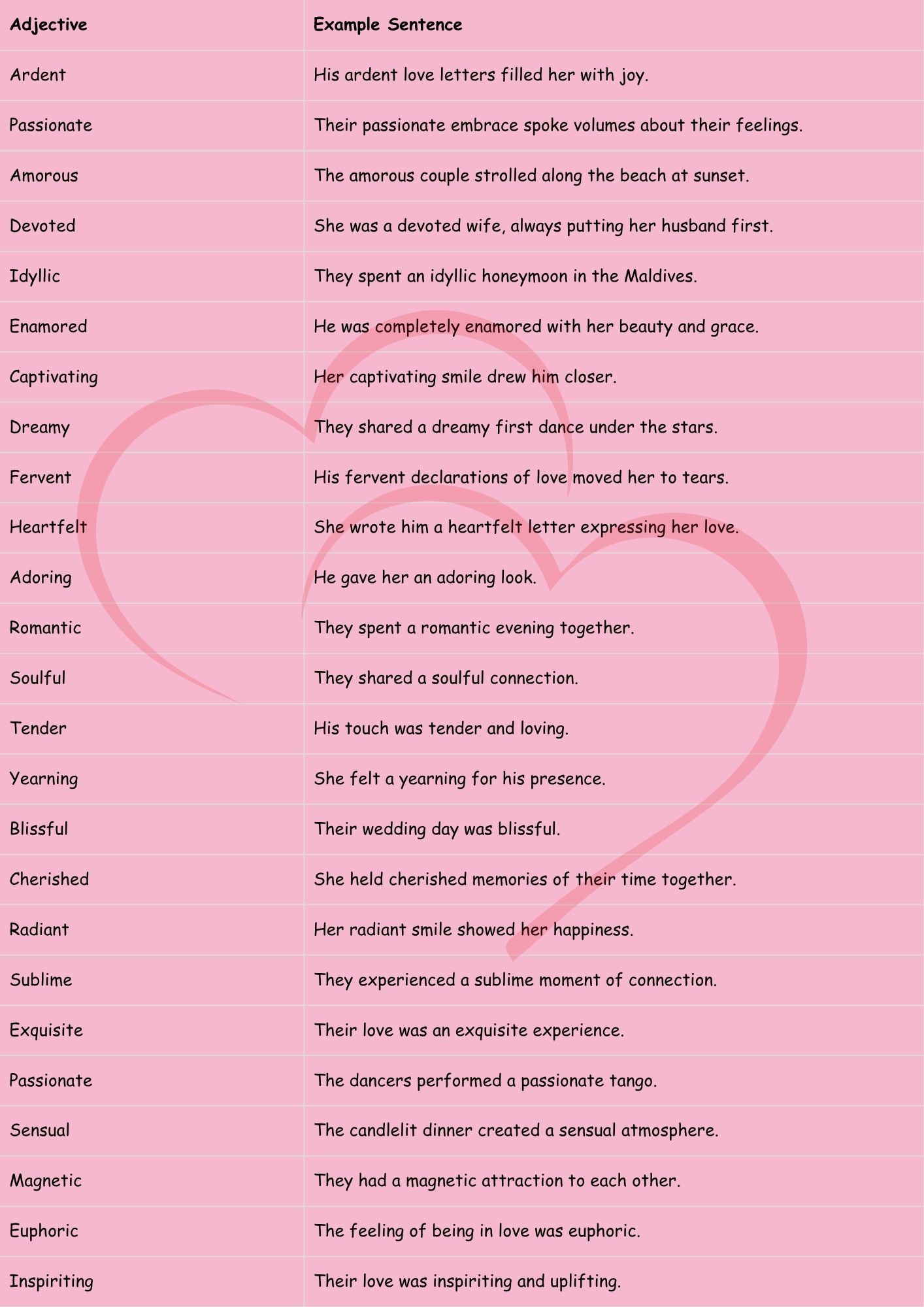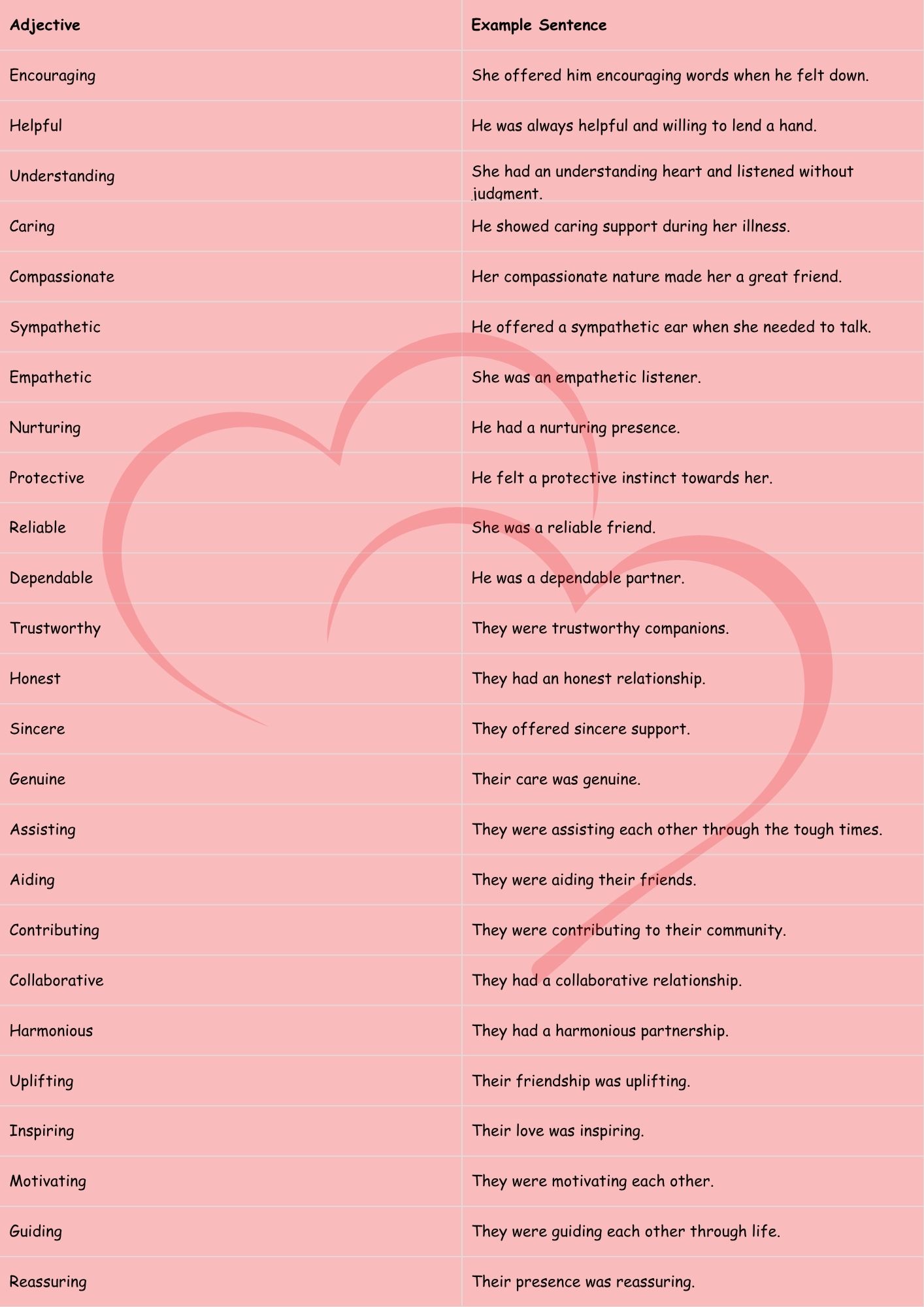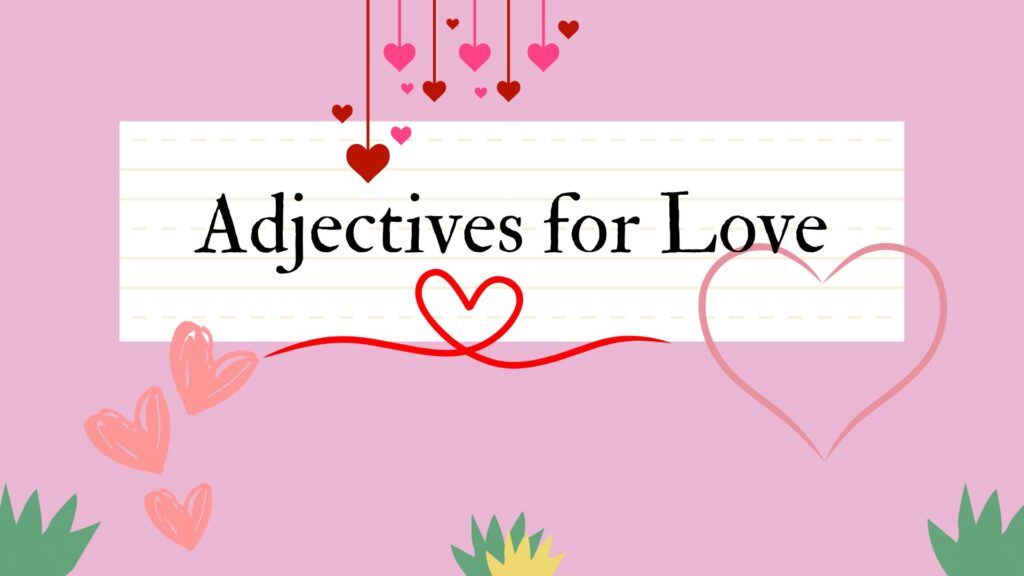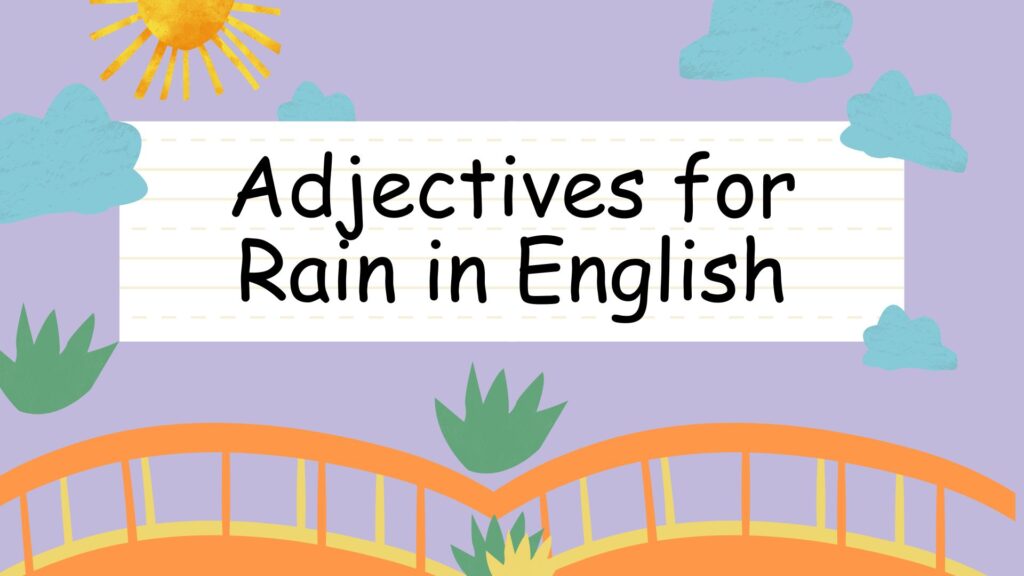Love, a multifaceted emotion, is often described using a rich tapestry of adjectives. Mastering these adjectives allows for more nuanced and expressive communication, whether you’re writing a heartfelt poem, crafting a romantic novel, or simply expressing your feelings to someone special. This article provides a comprehensive guide to adjectives for love, exploring their definitions, categories, usage rules, and common mistakes. It is designed for English language learners of all levels, from beginners seeking basic vocabulary to advanced learners aiming for stylistic precision. By the end of this guide, you’ll have a deeper understanding of how to use adjectives effectively to convey the many shades of love.
Table of Contents
- Introduction
- Definition of Adjectives for Love
- Structural Breakdown
- Types and Categories of Adjectives for Love
- Examples of Adjectives for Love
- Usage Rules for Adjectives of Love
- Common Mistakes
- Practice Exercises
- Advanced Topics
- FAQ
- Conclusion
Introduction
Love is a complex and powerful emotion that manifests in countless ways. To effectively articulate these nuances, we rely on a diverse vocabulary, particularly adjectives. Adjectives for love allow us to express not just the presence of love, but also its intensity, quality, and specific characteristics. Whether describing a fleeting crush or a lifelong commitment, the right adjective can make all the difference. Understanding these adjectives enhances both our written and spoken communication, adding depth and precision to our expressions of love.
This guide is designed to be a comprehensive resource for anyone looking to expand their vocabulary of love-related adjectives. We will explore different categories of adjectives, provide numerous examples, and offer practical exercises to help you master their usage. By studying this guide, you will be able to more accurately and eloquently express your feelings of love in various contexts.
Definition of Adjectives for Love
Adjectives for love are words that describe the qualities, characteristics, or intensity of love, affection, or related emotions. They modify nouns, providing more specific information about the type of love being expressed. These adjectives can convey the depth, sincerity, nature, and impact of love in a given situation.
Adjectives, as a part of speech, serve to modify or describe nouns and pronouns. They add detail and specificity, allowing us to paint a clearer picture with our words. In the context of love, adjectives are crucial for differentiating between various forms of affection, from the tender and gentle to the fiery and passionate. They allow us to express the unique nuances of our feelings.
These adjectives can be classified based on the type of love they describe. For instance, some adjectives describe romantic love (e.g., ardent, passionate), while others describe familial love (e.g., unconditional, protective), and still others describe platonic love (e.g., supportive, loyal). Understanding these distinctions is key to using adjectives for love correctly and effectively.
Structural Breakdown
Adjectives in English typically precede the noun they modify. For example, in the phrase “a loving mother,” the adjective “loving” comes before the noun “mother.” However, adjectives can also follow a linking verb, such as “is,” “are,” “was,” or “were.” For example, “Her love is unconditional.” In this case, “unconditional” follows the linking verb “is” and describes the noun “love.”
Adjectives can also be modified by adverbs to further intensify or qualify their meaning. For instance, “deeply romantic” uses the adverb “deeply” to emphasize the romantic nature of something. The structure is: Adverb + Adjective + Noun. This allows for even greater precision in expressing the nuances of love.
Many adjectives related to love can be formed by adding suffixes such as “-ing,” “-ed,” “-ful,” or “-able” to verbs or nouns. For example, “loving” is formed from the verb “love,” and “adorable” is formed from the verb “adore.” Understanding these structural patterns can help you expand your vocabulary and use adjectives more creatively.
Types and Categories of Adjectives for Love
Adjectives for love can be categorized based on the specific aspects of love they describe. Below are some common categories:
Romantic Adjectives
These adjectives describe the passionate and idealized aspects of love, often associated with romantic relationships. They evoke feelings of excitement, longing, and deep connection.
Affectionate Adjectives
These adjectives describe the gentle, caring, and tender aspects of love. They emphasize warmth, kindness, and a sense of closeness.
Passionate Adjectives
These adjectives describe the intense, fervent, and deeply emotional aspects of love. They convey a strong sense of desire, excitement, and energy.
Enduring Adjectives
These adjectives describe the lasting, steadfast, and resilient aspects of love. They highlight commitment, loyalty, and the ability to withstand challenges over time.
Supportive Adjectives
These adjectives describe the encouraging, helpful, and understanding aspects of love. They emphasize the importance of being there for someone and providing assistance and comfort.
Admiring Adjectives
These adjectives describe the awe-inspired, respectful, and appreciative aspects of love. They convey a sense of deep appreciation and high regard for the beloved.
Playful Adjectives
These adjectives describe the light-hearted, fun, and teasing aspects of love. They emphasize joy, laughter, and a sense of shared amusement.
Examples of Adjectives for Love
The following tables provide examples of adjectives for love, categorized by type. Each table includes numerous examples to illustrate the different ways these adjectives can be used.
Romantic Adjective Examples
This table showcases adjectives that capture the essence of romantic love, often associated with passion and deep connection.
| Adjective | Example Sentence |
|---|---|
| Ardent | His ardent love letters filled her with joy. |
| Passionate | Their passionate embrace spoke volumes about their feelings. |
| Amorous | The amorous couple strolled along the beach at sunset. |
| Devoted | She was a devoted wife, always putting her husband first. |
| Idyllic | They spent an idyllic honeymoon in the Maldives. |
| Enamored | He was completely enamored with her beauty and grace. |
| Captivating | Her captivating smile drew him closer. |
| Dreamy | They shared a dreamy first dance under the stars. |
| Fervent | His fervent declarations of love moved her to tears. |
| Heartfelt | She wrote him a heartfelt letter expressing her love. |
| Adoring | He gave her an adoring look. |
| Romantic | They spent a romantic evening together. |
| Soulful | They shared a soulful connection. |
| Tender | His touch was tender and loving. |
| Yearning | She felt a yearning for his presence. |
| Blissful | Their wedding day was blissful. |
| Cherished | She held cherished memories of their time together. |
| Radiant | Her radiant smile showed her happiness. |
| Sublime | They experienced a sublime moment of connection. |
| Exquisite | Their love was an exquisite experience. |
| Passionate | The dancers performed a passionate tango. |
| Sensual | The candlelit dinner created a sensual atmosphere. |
| Magnetic | They had a magnetic attraction to each other. |
| Euphoric | The feeling of being in love was euphoric. |
| Inspiriting | Their love was inspiriting and uplifting. |

Affectionate Adjective Examples
This table provides adjectives that describe the gentle and caring aspects of love, emphasizing warmth and tenderness.
| Adjective | Example Sentence |
|---|---|
| Loving | She was a loving mother to her children. |
| Caring | He showed caring concern for her well-being. |
| Gentle | His gentle touch soothed her worries. |
| Kind | She had a kind and compassionate heart. |
| Tender | He held her in a tender embrace. |
| Warm | She had a warm and welcoming smile. |
| Compassionate | His compassionate nature made him a great friend. |
| Empathetic | She was an empathetic listener, always understanding. |
| Nurturing | He had a nurturing presence that made everyone feel safe. |
| Thoughtful | She sent him a thoughtful gift on his birthday. |
| Benevolent | Her benevolent actions were appreciated. |
| Comforting | His words were comforting during the difficult time. |
| Sympathetic | She offered a sympathetic ear. |
| Patient | He was patient and understanding. |
| Considerate | She was always considerate of others’ feelings. |
| Gracious | Her gracious nature was admired by all. |
| Attentive | He was an attentive partner. |
| Affectionate | They shared an affectionate hug. |
| Friendly | They had a friendly relationship. |
| Cordial | Their meeting was cordial and respectful. |
| Soothing | The music had a soothing effect on her. |
| Supportive | He was a supportive friend. |
| Understanding | They shared an understanding bond. |
| Forgiving | She was forgiving and moved on. |
| Generous | They had a generous spirit. |
Passionate Adjective Examples
This table illustrates adjectives that describe the intense and fervent aspects of love, conveying a strong sense of desire and excitement.
| Adjective | Example Sentence |
|---|---|
| Intense | They shared an intense connection from the moment they met. |
| Fervent | His fervent kisses left her breathless. |
| Fiery | Their fiery passion was undeniable. |
| Burning | He had a burning desire to be with her. |
| Ardent | She received an ardent declaration of love. |
| Zealous | His zealous love for her knew no bounds. |
| Impassioned | He delivered an impassioned speech about their love. |
| Torrid | They shared a torrid affair. |
| Erotic | The painting had an erotic undertone. |
| Voluptuous | He was drawn to her voluptuous figure. |
| Exciting | They had an exciting relationship. |
| Thrilling | Their love was a thrilling adventure. |
| Magnetic | They had a magnetic pull towards each other. |
| Electrifying | Their first kiss was electrifying. |
| Consuming | Their love was all-consuming. |
| Overpowering | They had an overpowering attraction. |
| Uncontrollable | They felt an uncontrollable desire. |
| Violent | Their emotions were violent and raw. |
| Raging | They had a raging passion. |
| Fierce | Their love was fierce and protective. |
| Unbridled | They expressed their unbridled affection. |
| Unrestrained | Their feelings were unrestrained. |
| Uninhibited | They were uninhibited in their love. |
| Unleashed | Their passion was unleashed. |
| Unfettered | They had an unfettered connection. |
Enduring Adjective Examples
This table showcases adjectives that describe the lasting and steadfast aspects of love, highlighting commitment and resilience.
| Adjective | Example Sentence |
|---|---|
| Unwavering | Their unwavering love saw them through many hardships. |
| Steadfast | He remained steadfast in his love for her. |
| Eternal | They vowed to have an eternal love. |
| Timeless | Their love was a timeless romance. |
| Lasting | They built a lasting bond over the years. |
| Perpetual | They promised each other perpetual devotion. |
| Enduring | Their enduring love was an inspiration to others. |
| Resilient | Their resilient relationship survived many challenges. |
| Constant | Her constant affection never wavered. |
| Faithful | He was a faithful and devoted partner. |
| Loyal | They were loyal to each other. |
| Devoted | They were devoted to their family. |
| Committed | They were committed to each other. |
| Unbreakable | They had an unbreakable bond. |
| Inseparable | They were inseparable since childhood. |
| Unfailing | They had unfailing support for each other. |
| Unending | They shared an unending love. |
| Permanent | Their love was a permanent fixture in their lives. |
| Established | They had an established and strong relationship. |
| Deep-rooted | Their love was deep-rooted and strong. |
| Immutable | Their feelings were immutable. |
| Incorruptible | Their devotion was incorruptible. |
| Indestructible | Their bond was indestructible. |
| Solid | They built a solid foundation for their love. |
| Strong | They had a strong and healthy relationship. |
Supportive Adjective Examples
This table provides adjectives that describe the encouraging and helpful aspects of love, emphasizing understanding and assistance.
| Adjective | Example Sentence |
|---|---|
| Encouraging | She offered him encouraging words when he felt down. |
| Helpful | He was always helpful and willing to lend a hand. |
| Understanding | She had an understanding heart and listened without judgment. |
| Caring | He showed caring support during her illness. |
| Compassionate | Her compassionate nature made her a great friend. |
| Sympathetic | He offered a sympathetic ear when she needed to talk. |
| Empathetic | She was an empathetic listener. |
| Nurturing | He had a nurturing presence. |
| Protective | He felt a protective instinct towards her. |
| Reliable | She was a reliable friend. |
| Dependable | He was a dependable partner. |
| Trustworthy | They were trustworthy companions. |
| Honest | They had an honest relationship. |
| Sincere | They offered sincere support. |
| Genuine | Their care was genuine. |
| Assisting | They were assisting each other through the tough times. |
| Aiding | They were aiding their friends. |
| Contributing | They were contributing to their community. |
| Collaborative | They had a collaborative relationship. |
| Harmonious | They had a harmonious partnership. |
| Uplifting | Their friendship was uplifting. |
| Inspiring | Their love was inspiring. |
| Motivating | They were motivating each other. |
| Guiding | They were guiding each other through life. |
| Reassuring | Their presence was reassuring. |

Usage Rules for Adjectives of Love
Using adjectives for love correctly involves understanding their specific meanings and connotations. Some adjectives are more appropriate in certain contexts than others. For example, “ardent” might be suitable for describing romantic love, but less so for describing familial love. Similarly, “unconditional” is commonly used to describe familial love, but can also apply to romantic love in certain situations.
Pay attention to the intensity conveyed by different adjectives. “Fond” suggests a mild affection, while “passionate” implies a much stronger emotion. Choose adjectives that accurately reflect the depth and nature of the love you are describing.
Be mindful of potential clichés. Overusing certain adjectives (e.g., “true love,” “eternal love”) can make your writing sound unoriginal or insincere. Strive to use a variety of adjectives and find fresh ways to express your feelings.
Common Mistakes
One common mistake is using adjectives that don’t accurately reflect the type of love being described. For instance, saying “He has an erotic love for his mother” is inappropriate because “erotic” implies sexual desire, which is not suitable for describing familial love. The correct adjective might be “He has a deep love for his mother.”
Another mistake is using adjectives that are too strong or too weak for the context. For example, saying “I have a lukewarm love for my best friend” is an understatement, as “lukewarm” implies a lack of enthusiasm. A better adjective would be “I have a strong love for my best friend.”
Finally, avoid using adjectives redundantly. For example, saying “a very passionate love” is redundant because “passionate” already implies a high degree of intensity. Simply saying “a passionate love” is more concise and effective.
Here are some examples of common mistakes and their corrections:
| Incorrect | Correct | Explanation |
|---|---|---|
| He has an erotic love for his mother. | He has a deep love for his mother. | “Erotic” implies sexual desire, inappropriate for familial love. |
| I have a lukewarm love for my best friend. | I have a strong love for my best friend. | “Lukewarm” is an understatement for the affection towards a best friend. |
| A very passionate love. | A passionate love. | “Very” is redundant with “passionate.” |
| She felt an obsessive love for ice cream. | She felt a strong liking for ice cream. | “Obsessive love” is too intense for inanimate objects. |
| Their platonic love was amorous. | Their platonic love was supportive. | “Amorous” suggests romance, conflicting with “platonic.” |
Practice Exercises
Test your understanding of adjectives for love with the following exercises. Choose the best adjective from the options provided to complete each sentence.
Exercise 1: Fill in the Blanks
| Question | Options | Answer |
|---|---|---|
| 1. Their ______ love story was an inspiration to everyone. | a) lukewarm, b) enduring, c) apathetic | b) enduring |
| 2. He gave her a ______ look, full of admiration. | a) hateful, b) adoring, c) indifferent | b) adoring |
| 3. They shared a ______ embrace after being apart for so long. | a) hostile, b) tender, c) cold | b) tender |
| 4. Her ______ support helped him through the difficult times. | a) undermining, b) encouraging, c) discouraging | b) encouraging |
| 5. Their ______ passion was evident in every glance. | a) subdued, b) fiery, c) calm | b) fiery |
| 6. They were ______ to each other, always putting the other’s needs first. | a) indifferent, b) devoted, c) hostile | b) devoted |
| 7. The ______ atmosphere of the evening made it perfect for romance. | a) tense, b) romantic, c) awkward | b) romantic |
| 8. She felt a ______ longing for his presence. | a) slight, b) yearning, c) minimal | b) yearning |
| 9. He was a ______ and caring friend, always there to listen. | a) negligent, b) thoughtful, c) uncaring | b) thoughtful |
| 10. They had an ______ bond that could not be broken. | a) fragile, b) unbreakable, c) weak | b) unbreakable |
Exercise 2: Sentence Completion
Complete each sentence with an appropriate adjective for love.
| Question | Answer |
|---|---|
| 1. The couple shared a ______ kiss under the moonlight. | passionate/romantic |
| 2. She had a ______ love for her family, always putting them first. | unconditional/loving |
| 3. He felt a ______ attraction to her from the moment they met. | magnetic/intense |
| 4. They built a ______ relationship based on trust and respect. | strong/enduring |
| 5. Her ______ support helped him achieve his dreams. | encouraging/supportive |
| 6. They had a very ______ friendship. | caring/supportive |
| 7. He felt a ______ need to protect her. | strong/protective |
| 8. Their love was like a ______ flame. | burning/fiery |
| 9. They shared a ______ moment of pure happiness. | blissful/joyful |
| 10. Their relationship was ______ and inspiring. | uplifting/motivating |
Advanced Topics
For advanced learners, exploring the nuances of adjectives for love can involve delving into their etymology and historical usage. Understanding the origins of words like “ardent” (from Latin ardens, meaning “burning”) can provide deeper insights into their connotations.
Additionally, consider the cultural context in which adjectives for love are used. Different cultures may have different expressions of love, and the adjectives used to describe these expressions may vary accordingly. Studying literature and poetry from different cultures can broaden your understanding of the diverse ways love is expressed.
Finally, experiment with using adjectives for love in creative writing. Try writing poems, short stories, or song lyrics that incorporate a variety of adjectives to convey different aspects of love. This will help you develop your own unique voice and style.
FAQ
Q1: What is the difference between “loving” and “affectionate”?
A: While both words describe positive feelings, “loving” generally implies a deep and profound emotion, often associated with commitment and devotion. “Affectionate,” on the other hand, suggests a more gentle and tender expression of warmth and caring. You might describe a parent as “loving” and a close friend as “affectionate.”
Q2: Can adjectives for love be used to describe non-romantic relationships?
A: Yes, many adjectives for love can be used to describe familial, platonic, or even self-love. For example, “caring,” “supportive,” and “loyal” are applicable to various types of relationships. However, some adjectives, like “amorous” or “passionate,” are more specifically associated with romantic love.
Q3: How can I avoid using clichés when describing love?
A: To avoid clichés, try to be specific and descriptive in your writing. Instead of relying on generic adjectives like “true love,” focus on the unique qualities and characteristics of the love you are describing. Use vivid imagery and sensory details to bring your words to life. Also, try to expand your vocabulary and use less common adjectives that still accurately convey your meaning.
Q4: Are there any adjectives for love that have negative connotations?
A: Yes, some adjectives, while technically describing aspects of love, can have negative connotations. For example, “obsessive” implies an unhealthy and controlling form of love. “Possessive” suggests a desire to dominate or restrict the other person. It’s important to use these adjectives carefully and be aware of their potential negative implications.
Q5: How do I choose the right adjective to describe a particular type of love?
A: Consider the context, the relationship between the individuals involved, and the specific emotions you want to convey. Think about the intensity, quality, and characteristics of the love you are describing, and choose an adjective that accurately reflects those nuances. If you’re unsure, consult a dictionary or thesaurus to explore different options.
Q6: Can I use multiple adjectives to describe love?
A: Absolutely! Using multiple adjectives can add depth and complexity to your descriptions. For example, you might describe a love as “tender and unwavering” or “passionate and devoted.” Just be sure to use adjectives that complement each other and avoid redundancy.
Q7: What role do adverbs play in modifying adjectives for love?
A: Adverbs can intensify or qualify the meaning of adjectives for love. For example, “deeply loving,” “truly devoted,” or “incredibly passionate.” Adverbs add another layer of precision and nuance to your expressions of love.
Q8: How can I improve my vocabulary of adjectives for love?
A: Read widely and pay attention to the adjectives used by different authors to describe love. Keep a vocabulary notebook and jot down new words you encounter. Practice using these words in your own writing and speaking. Consider using a thesaurus to explore synonyms and related terms. The more you expose yourself to different expressions of love, the richer your vocabulary will become.
Conclusion
Mastering adjectives for love is essential for expressing the full spectrum of human emotion. By understanding the different categories of adjectives, their usage rules, and common mistakes, you can enhance your ability to communicate effectively and eloquently about love in all its forms. Remember to choose adjectives that accurately reflect the intensity, quality, and context of the love you are describing.
Continue to expand your vocabulary by reading widely, paying attention to the language used by
others, and practicing your writing. The more you immerse yourself in the language of love, the better equipped you’ll be to express your feelings with precision and grace. Embrace the power of adjectives to articulate the beautiful and complex emotion that is love.



